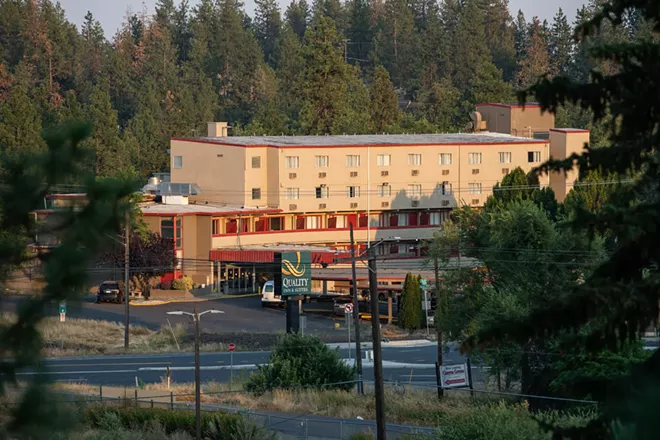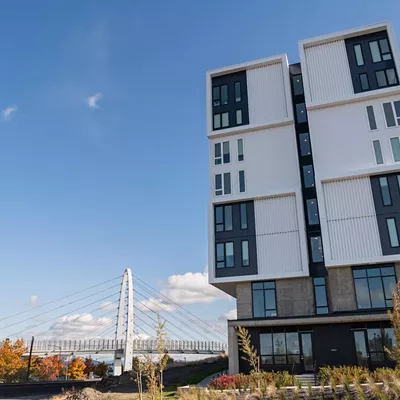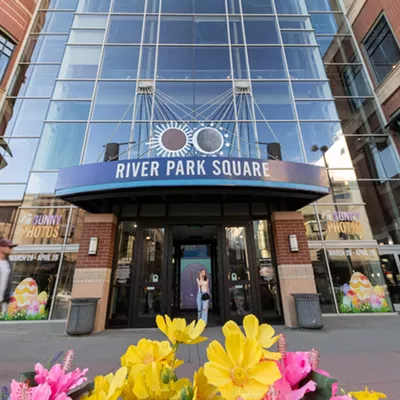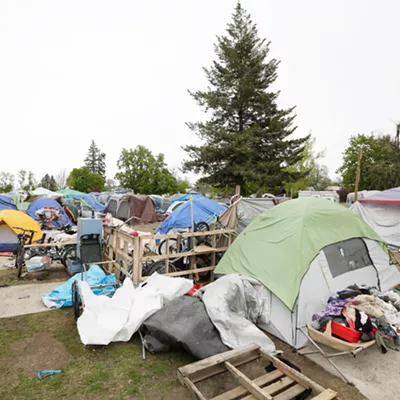
West Hills neighbors gather on a quiet residential street Tuesday evening, Aug. 16, grabbing cups of ice-cold lemonade and sitting in wooden deck chairs as their kids and grandkids weave their bikes between the socializing adults. While someone throws hot dogs on the grill amid laughter and conversation, this block party carries a serious tone, as neighbors spend hours discussing their concerns about projects that could bring more people experiencing homelessness into their neighborhood.
Already, several people say, homeowners have clashed with dispersed homeless campers in the neighborhood, which starts at the west side of Browne's Addition and stretches along Sunset Highway. Some report their cars being broken into, their garages robbed of valuables, and their hikes along Fish Lake Trail and near Indian Canyon Golf Course tainted by the danger of used needles and unsightly garbage.
Just last week, neighbors near F Street say they helped a woman who they guessed might have been assaulted before she wandered incoherently for several hours before they could get medical care to arrive and help her.
Although none of the incidents described appear to have ties to a structured homeless shelter or transitional housing, neighbors worry that proposals to move some residents from Camp Hope to their neighborhood will make things worse.
In order to get homeless encampments off Washington State Department of Transportation (WSDOT) property while ensuring people are placed into supportive options, lawmakers this spring approved a $144 million budget item for the state Department of Commerce. The agency will pay nonprofits that can help house and serve people camping in five counties, including Spokane.
Earlier this summer, local governments in Spokane, Spokane County and Spokane Valley, and numerous nonprofits that work with the homeless, came together to submit a list of projects to Commerce that could house people within 90 days. The first batch of projects submitted July 20, totaling about $24 million, could be funded if Commerce agrees they're ready, says Brian Coddington, city of Spokane spokesman. Another list of about $10.5 million in projects that didn't have universal agreement among the community partners was submitted at the same time in case other jurisdictions don't use their part of the money.
"As we came together, it became obvious a couple of projects were universally supported for their ability to meet the criteria that Commerce had established," Coddington says. "One is the assessment of needs at the camp, to know by name and by need those individuals on WSDOT property, what their situation looks like, what their needs are, what the best fit might be... the other piece is the Catalyst Project that Catholic Charities is spearheading."
So far, those two projects are the only ones developing contracts with Commerce. Empire Health Foundation will lead the assessment and outreach at Camp Hope, and Catholic Charities is working to buy the Quality Inn on Sunset Highway to create permanent supportive housing that could help transition 120 people at a time from homelessness into more-traditional permanent housing options.
Neighbors near Camp Hope, which has grown to more than 600 people living on WSDOT land near Interstate 90 and Freya Street, say that property crime in their area has risen over the last several months.
Many West Hills neighbors worry their community could see the same issues if some of those residents move to the Quality Inn.
"We do not want that shelter in our neighborhood," says Sandy Nichols, who bought his West Hills home 11 years ago. "This happens with every shelter: They bring in a blight of crime, and around those shelters there's drug addiction, dealing, mental health, physical violence, breaking and entering, felony theft, you name it."
CATALYST AT THE QUALITY INN
At least half of Commerce's $144 million must go toward permanent housing. One way to get people out of homelessness into a permanent home is a transitional phase through supportive housing, where residents are referred to the site by providers and then paired with intensive, on-site case management.
Converting the Quality Inn to the Catalyst Project requires renovating 87 rooms to house up to 120 people who will get case-by-case help with medical care, substance use, public benefits and more. The site will be fenced and monitored by security. About 30 staff members will be hired to help with case management, behavioral health, security, maintenance and 24/7 operation of the facility, says Jonathan Mallahan, chief housing officer for Catholic Charities of Eastern Washington.
The Catalyst ask includes $6.5 million to buy the property, $1.8 million for initial renovations and $5.5 million for initial operations as the site transitions from emergency supportive housing to permanent supportive housing, when costs are expected to decrease. Upfront costs include providing additional transportation and meals to residents until units are more self-sufficient. Some services could be subsidized after units are fully converted and residents may qualify for housing assistance, Mallahan says.
Overall, Catholic Charities plans to house 100 people from Camp Hope between its existing low-barrier, drop-in shelter downtown, the House of Charity, and the Catalyst site. Those with less complex needs and barriers to housing will be more likely to be placed in the Catalyst.
"We're referring to it as continuous stay, where they can be there as long as they need to, they won't have an expiration date, and we will work with them until we find them permanent housing," Mallahan explains. "This is not a drop-in shelter."
Those accepted will have undergone screening to ensure they are ready and willing to work toward permanent housing, and residents must abide by Catholic Charities' good neighbor policies, Mallahan says, adding that residents will not be allowed to use drugs or alcohol on site or in the neighborhood.
"We want them to have a desire to make a positive change in their lives, set their own goals and move forward," Mallahan says. "I know with our management of this facility we'll show we're good stewards of our community."
WEST HILLS CONCERNS
The Catalyst site is about 2 miles from grocery stores, and about a mile from where West Hills neighbors gathered last week to discuss their concerns.
"My take on it is really strongly that it's not the right solution for all of the people in Spokane, not just the homeless people or working class people," says Sarah Hunter, a nurse with three young children who lives in West Hills. "From what I've read about Camp Hope, the majority of them want a pallet home. They don't want anyone telling them when to go to bed, and I personally understand that. But if they don't want to recover, a transitional shelter doesn't seem like a viable plan, especially with the money being put out to buy it."
Multiple neighbors question if using $14 million for 120 people is the best use of money.
Mallahan, meanwhile, says that Commerce did not claim that $24 million would be sufficient to house all 600-plus people living at Camp Hope.
"This is right-sized to serve people here in a safe and effective way," Mallahan says. "It is quite the investment, but we're talking about removing 100 people from homelesness and supporting them on an ongoing basis."
Hunter wonders if smaller supportive housing locations with 40 or fewer people would be more effective. She also questions the safety near Catholic Charities housing in downtown, where businesses have reported issues.
"We think that they will walk from the Quality Inn through our neighborhood to get downtown and get services," Hunter says. "We don't want this turning any worse than it's already getting."
Mallahan says concerns often assume problems downtown are caused by Catholic Charities residents when they may not be.
"We work closely to make sure our residents are not creating challenges for our neighbors," Mallahan says. "This is a contained site that will have intensive services on site."
COMMUNICATION
Many neighbors are mad that the proposal wasn't discussed with them before it was presented to Commerce as a turnkey project.William Hagge, interim chair of the West Hills Neighborhood Council, says there was zero communication before the list was submitted.
"Ultimately, I think this would've been much more well received if the neighborhood council and residents had a voice in this, because all of us want to see something positive," Hagge says. "All of us want to work with the city and people that are in need."
The city has been working to schedule a meeting with Catholic Charities, Commerce and West Hills neighbors that could happen this week.
Some of the outcry is based on other projects that have not yet received approval or funding. One proposal would place 75 pallet homes or tiny homes on an Empire Health Foundation property near Sunset Boulevard and Government Way.
If that project moves forward, Empire Health would install a transitional village concept at a former RV park on the property that could easily be updated to hook up electrical and water, explains Empire Health Foundation President Zeke Smith.
Currently, part of the Empire Health property is home to a sober living community that, contrary to rumors, is not being kicked out, Smith says. Behind that community is open space that could be used for tiny homes. Empire Health also intends to build permanent affordable housing on part of the property.
"We've got to get together and effectively identify how we provide better housing options," Smith says, "how we meet the human needs in an effective way so it's not just moving them from one place and having them scattered in another place."
Eliminating Camp Hope will be a function of what support the community provides, Smith says. Empire Health will help assess what those needs look like in its outreach work with Camp Hope residents.
If both projects open, West Hills neighbors worry about getting more than 200 people from the camp.
"The biggest NIMBY is the mayor," West Hills resident Nichols says. "She wants to sweep all the homeless from downtown and put them in my neighborhood instead."
While Mayor Nadine Woodward and Spokane City Council President Breean Beggs signed the list of proposals to Commerce, the state agency will ultimately determine which projects get money. Organizations will mostly receive payments directly from Commerce, city spokesman Coddington says.
"We want to get people connected to a place that's safer and healthier and more humane than a field," Coddington says. "Mayor Woodward shares the concern about shifting a problem from one neighborhood to the other and is very much against doing that."
Instead, she wants a more distributed model that doesn't concentrate services in one or two neighborhoods, he says.
Addressing the complex needs of hundreds as quickly as possible will also take unprecedented coordination, Smith says, adding: "I just don't think we as a community have really come to terms with the size and scope of homelessness in this region." ♦























